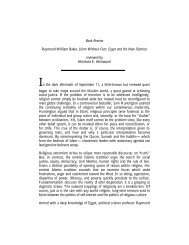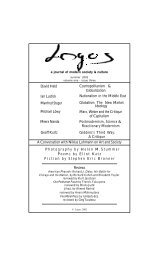Michael J. Thompson Stephen Eric Bronner Wadood Hamad - Logos
Michael J. Thompson Stephen Eric Bronner Wadood Hamad - Logos
Michael J. Thompson Stephen Eric Bronner Wadood Hamad - Logos
You also want an ePaper? Increase the reach of your titles
YUMPU automatically turns print PDFs into web optimized ePapers that Google loves.
Stanley Aronowitz<br />
siege, political repression was still alive and well in the United States. The<br />
Causes of World War Three (1958) is, in many respects, a popularization and<br />
application to the international scale of The Power Elite. It depicts world<br />
politics in terms of the rivalry to two power blocs, one led by the United<br />
States and the other by the Soviet Union, both of which are governed by<br />
irresponsible élites whose conduct of the nuclear arms race threatens the very<br />
existence of humanity. Written in a period when one could count the number<br />
of radicals with full-time appointments in American universities on one hand<br />
and when the preponderant ex-radicals had “chosen the west,” this equalization<br />
of responsibility for the world crisis between east and west endeared Mills<br />
neither to the communists and their periphery, for whom the Soviet Union<br />
was virtually blameless for the state of things, nor to Cold War liberals for<br />
whom any suggestion that United States foreign policy could contribute to the<br />
chances for the outbreak of World War III was as shocking as it was absurd.<br />
Hidden in the pages of his work is the influence of the one rather obscure<br />
strain of radicalism which, after the war, declared that both camps were forms<br />
of a new anti-democratic, militaristic capitalism and boldly, but futilely, called<br />
for the formation of a “third” camp whose base would be a radicalized labor<br />
movement in alliance with other anti-capitalist elements of the population.<br />
The project failed since at the time of its formulation, the leading unions in<br />
every capitalist country were busy making deals with their own corporations<br />
and with the capitalist state, and leftists were divided between those who were<br />
safely ensconced in the Cold War consensus or, despite everything, remained<br />
Soviet apologists. Mills’s appeal to the “public,” translated in this context to an<br />
appeal to the middle class liberal center, proved more effective for it<br />
corresponded to the emergence of a mass movement against the testing and use<br />
of nuclear weapons and for an end to the Cold War. Needless to say, the<br />
preponderance of American labor leaders, including Walter Reuther, the liberal<br />
president of the largest industrial union, the auto workers, were aligned with<br />
their own government’s policies and were convinced that the price of<br />
demilitarization was nothing less than a new slump. And even as he discounted<br />
the politicos as allies to the top layers of corporate and military power, Mills<br />
was equally skeptical that the intellectuals, the social type upon which political<br />
dissent conventionally relies, were adequate to the occasion.<br />
<strong>Logos</strong> 2.3 – Summer 2003




